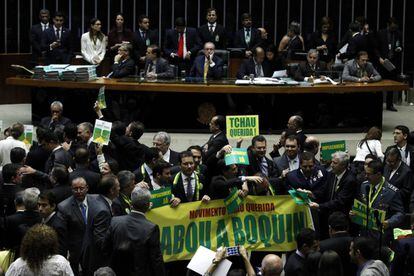Brazil’s Congress approves process to impeach President Dilma Rousseff
Embattled leader’s future now lies in the hands of the Senate


Brazil’s Congress has voted to begin impeachment proceedings against President Dilma Rousseff as part of a process that the embattled leader has described as a “Constitutional coup” to overthrow her.
The noisy debate began on Friday and continued late into Sunday night, when 367 deputies voted in favor of impeachment, with just 137 voting against. Rousseff failed to secure the support she needed, and more than the necessary two-thirds of lawmakers in the Chamber of Deputies voted to remove her from office.
Rousseff is accused of manipulating budget accounts shortly before the 2014 election in order to conceal the true size of the budget deficit
Rousseff is accused of manipulating budget accounts shortly before the 2014 election in order to conceal the true size of the budget deficit
Rousseff’s fate now lies in the hands of the Senate. If by a simple majority the upper house votes to take it up and put the president on trial, Rousseff will be temporarily suspended. In that case, Vice President Michel Temer would take on the presidential duties and the Senate would have 180 days to conduct a trial against Rousseff.
At the same time as deputies in Congress argued, insulted and shouted at each other, Brazilians took to the streets of the country’s main cities. In Brasilia, the nation’s capital, and home to a large middle class, polls show that some 60% of residents support impeachment. On Sunday afternoon thousands of people lined up front of the Congress. On one side of a heavily policed metal barrier opponents and supporters of the two-time president chanted slogans.
Rousseff will now have to decide whether to fight on. She has suggested she might appeal to the Supreme Federal Tribunal, Brazil's highest court, on the grounds that the accusations are flawed.
She could also lobby senators and at the same time bring more members and supporters of her Worker's Party on the streets to pressure the Congress.
Congress’s vote comes after months of fighting. Impeachment proponents say Rousseff has hurt Latin America’s largest economy by hiding deficits and allowing overspending that has contributed to its worst recession since the 1930s. Her popularity ratings have dropped below 10% in recent months.
At the same time as deputies in Congress argued, insulted and shouted at each other, Brazilians took to the streets of the country’s main cities
Rousseff insists she is being targeted by elite groups angry about the hold on power of the Worker's Party over the last 13 years, accusing them of illegally trying to take control of the country. Many of those seeking to overthrow her, such as Eduardo Cunha, who presided over Sunday’s debate, are themselves accused of corruption.
According to watchdog groups, around 60% of the 594 members of Congress face corruption and other charges.
The worsening political crisis comes as Brazil faces a shrinking economy and inflation of around 10%, while an outbreak of the Zika virus, which can cause devastating birth defects, is rampant in the northeast of the country. Rio de Janeiro is gearing up to host the Olympics in August, but sharp budget cuts have fueled worries about whether the country will be ready.
English version by Nick Lyne.












































